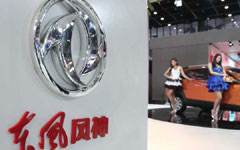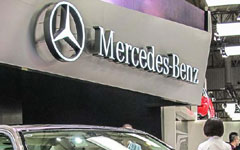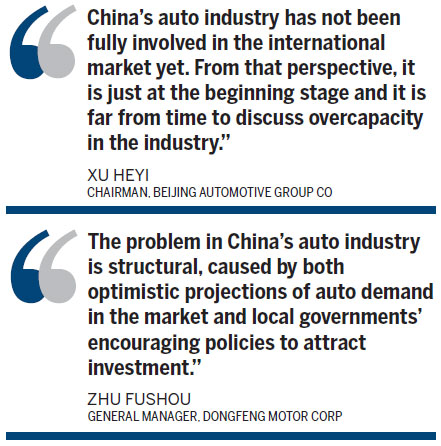The problem in China's auto industry is structural, caused by both optimistic projections of auto demand in the market and local governments' encouraging policies to attract investment, said Zhu.
He said many auto company owners are affected by local governments when they decide when and where to expand their production plants.
"If the local governments cut their intervention, company owners will be more rational when they make investment decisions."
|
 |
 |
On one hand, Chinese auto companies are expanding capacity and improving technologies to meet domestic demand. On the other hand, they are also making efforts to establish their brands in the global market.
As a State-owned auto producer, Beijing Automotive is not a pioneer among Chinese companies in terms of going global. But Xu said the company plans to establish seven strategic operational centers globally and frame 30 key market exploration plans in five to eight years.
There were rumors that the company is planning to acquire a high-end European or US auto brand, but Xu denied it during the forum.
But he said the company is cooperating with some US companies in Silicon Valley to develop an electronic vehicle, which will be on the market by the end of next year.
But he declined to reveal the price or type of car.
"It will be a product better than Elon Musk have made their contribution by bringing innovation to the auto industry. But Tesla will not be able to become the Apple Inc of the auto industry and Elon Musk is not Steve Jobs."
Promising direction
He said in addition to the EV, the hybrid vehicle is a promising direction for the auto industry.
 "We have done lots of research on hybrid vehicles and we are trying to persuade related government departments to pay more attention to this sector," he said.
"We have done lots of research on hybrid vehicles and we are trying to persuade related government departments to pay more attention to this sector," he said.
Besides technology exchanges, some Chinese companies choose mergers and acquisitions to go global.
Dongfeng announced in February that it has purchased a 14.1 percent stake in French automaker PSA Peugeot Citroen for 800 million euros ($1.09 billion).
Zhu said the deal has already won approval from the Chinese government.
"We have to become international if we want to build into a global brand," he said.
The company said the partnership will enhance research and development capability along the entire value chain and strengthen overseas cooperation with a target of selling 1.5 million vehicles under the Dongfeng, Peugeot SA and Citroen brands each year starting from 2020.
In 2013, Dongfeng Motor sold 3.53 million vehicles in China, up 14.8 percent.
The company has been working toward internationalization for several years.
In late 2012, Dongfeng agreed with its Japanese partner Nissan Motor Co to locally produce premium Infiniti vehicles in a plant in Xiangyang, Hubei province.
It also signed a $1.3 billion joint venture agreement with Renault SA in December, the first production facility for the French automaker in China.
